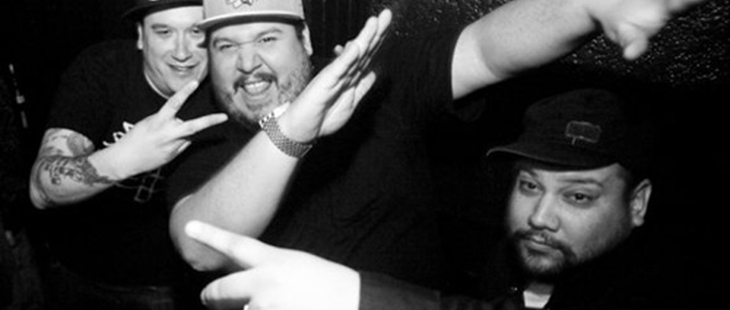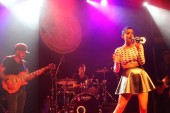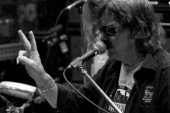

It would be too easy to filter A Tribe Called Red through a cultural lens, as Native-first DJs-second. Based out of Ottawa, where they’re behind the popular monthly Electric Pow Wow party, the three-member crew is doing something much more ambitious: they’re transforming what you think you know about indigenous music (no Putumayo).
Lifting the traditional pulse of pow wow compositions, A Tribe Called Red (Bear Witness, DJ NDN and DJ Shub) updates it using varied club sounds to create their own hybrid – pow wow step. The group’s first official single, a dubstep retread of Northern Cree’s “Red Skin Girl,” dropped this summer. Both times I heard it played in a bar (the first at ATCR’s Toronto debut in August, the second time cued from my laptop at Blansdowne dive, Stella) I witnessed some real visceral reactions; eyes slowly widening, bodies moving, and lots of mouthing “OMG.”
The wordless, pulse-dependent, increasingly DIY nature of electronic music – from dubstep to house to electro to moombahton to hardstyle – is flattening who makes it and, much more importantly, who listens to it. A nod from Diplo’s influential imprint Mad Decent, was an important look for A Tribe Called Red who recently released the Moombah Hip Moombah Hop remix EP. Catch them in Toronto tonight, playing the imagineNATIVE Film Festival after party.
What communities do you represent?
DJ NDN: I’m Ojibwe from Nipissing First Nation.
DJ Shub: I’m Cayuga Six Nations.
Bear Witness: And I’m also Cayuga Six Nations.
How did you guys grow up? Were you connected to your cultures?
Bear: I was born in Buffalo and raised in Toronto. My dad’s side of the family is the Six Nations side and I spent a fair amount of time there as a kid. But my mom’s side is four generations from New York City, so my connection comes from being a part of the aboriginal arts community in Toronto.
NDN: I grew up in Ottawa but spent summers on the reserve. I have eight aunts and, like, one thousand cousins, so I have a lot of family that lives on reserves.
Shub: All my family grew up in Six Nations and both of my parents live there now. I was in Fort Erie, so it’s going back and forth from there.
I remember hearing something recently about more and more native people moving into urban cities, but that can’t be a new thing…
Bear: There’s a long history of aboriginal people in urban communities, obviously, in North America. But if you’re an aboriginal person in an urban community who doesn’t fit the stereotype – you’re not on the street or walking around in buckskin and feathers – all of a sudden you become invisible and you’re just kind of living like everybody else. That’s something we’ve been talking about for a while now and it’s starting to change as the communities in the city grow faster and bigger and are doing more stuff. Especially within the arts we’re becoming very visible.
How long have you been making music together as A Tribe Called Red?
DJ NDN: Bear and I started doing mash-up stuff about three years ago when we started the Electric Pow Wow parties in 2008; we did one over a Diplo beat with some pow wow stuff and just chopped it up. When Dan joined, two years ago, we actually started making beats with pow wow music.
Bear Witness: The idea with Electric Pow Wow was to create a comfortable space for our community to come out here in Ottawa. A big part of that was creating pow wow step music to give something back, and create a club music that aboriginal people could relate to.
Can you explain the name to me? Is it a riff on A Tribe Called Quest?
Bear: That’s definitely a part of it, especially the way they used the word ‘tribe’ to describe their crew. As friends, we refer to ourselves as the tribe. But the ‘red’ part came from conversations with a guy who prints RedSkin Magazine. He was trying to find a term that would represent all the aboriginal people of the Americas. Since we’re all such individual and distinct cultures – even in Ontario there is a lot of difference between aboriginal communities – red was something everybody could identify with.
Why do you think your stuff works with contemporary electronic music?
NDN: Because they’re made to make you dance! We work with dubstep because it’s both the sound of the time, and the tempo was right when we first started experimenting with it.
Bear: One thing I’m excited about these days is the idea of world aboriginal electronic music. From Australia to New Zealand, Angola and Brazil… People like Spoek Mathambo out of South Africa or Javier Estrada and Toy Selectah from Monterey… It’s coming out of everywhere right now. The way people are bringing knowledge of their own traditions and cultures and mixing it with their urban experience makes me so excited because they’re working on the same idea we are. There’s a real kind of unity coming out of this.
I read online that some native people aren’t necessarily into the idea of pow wow music at the club…
NDN: The problem those people had was that alcohol was being served in a place where they the term ‘pow wow’ was used, and what we’re trying to do with our party is, yeah, essentially a pow wow, but modernized. It’s a gathering of friends to listen to music and people dancing. That’s how we interpret the term ‘pow wow’ and use it for what we’re doing.
There’s a class of songs used for specific ceremonies and specific to every kind of dance – so there’s a lot. But, on top of it, there are sacred ceremonies that happen inside of these pow wows – like grand entry, or a dropped feather, or for the blessing of the food – with their own specific songs and where you’re not allowed to film or record, or you have to take your hat off, or stand. There are a lot of rules, and those specific honour songs we would never touch.
Bear: A really important thing is that we’re using really specific songs when we’re remixing. We’re using stuff that’s used for dance competition pow wows, not even the music that would be used for a traditional pow wow, and definitely nothing that is sacred or has a deeper, spiritual connection. I mean, all of it does and that’s where we fall into a bit of a gray area with having it in clubs, but we’re careful to use stuff that’s more modern, where they use English lyrics, et cetera.
In the long run, pow wow is a relatively recent thing that originated in the plains but spread across the Americas. What we’re all familiar with is the modern pow wow, and the idea of coming together to eat and dance and have a good.
How much of what you do is political?
NDN: I’d say it’s all political. We’re doing something that’s never been done before, and we’re expressing ourselves in a way that kind of sticks it to the man.
Bear: I come from a really political family and one of the things my mom told me from a really young age was, “You’re an aboriginal person, therefore everything you do in your life is political.”
Bear, you’re also an audiovisual artist who works with pop culture depictions of aboriginal people. Do you ever think reappropriating stuff can backfire?
Bear: First of all, I’m not a big fan of the term ‘reappropriation.’ I like to call it an active decolonization. We’re taking these negative or one-dimensional images and representations of aboriginal people from media and music and from, well, anywhere and not just flipping them around, but finding ways to reinterpret them as something positive. It takes the negative power out of them; they cease to become an affront.
But yeah, there’s definitely also a worry about the way people are going to interpret. And that’s why doing interviews and talking about it as much as we can is really important. I’ve seen stuff written about us where people don’t get it… they’ll post our songs with pictures of spirit horses and all kinds of weird stuff. But then, other people get it right away and when I see that happening I’m like, ‘Okay, there might be people who miss it, but there are people getting it too.’
__
Anupa Mistry is a regular music writer for Toronto Standard.














